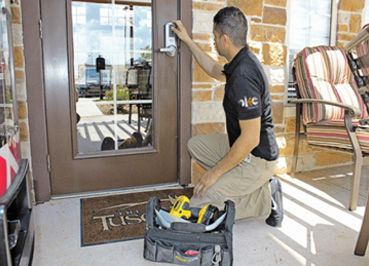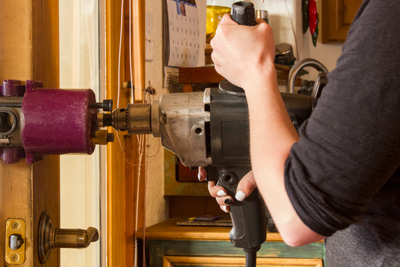
Facts You Might Not Know About Locksmiths
Locksmiths play a crucial role in our lives, often taking care of our security without us even realizing it. From duplicating keys to installing high-tech security systems, locksmiths are professionals who specialize in a variety of services related to locks and keys.
One interesting fact about locksmiths is that they have the ability to rekey locks. This means that if you lose your keys or you want to prevent someone from using an old key to access your property, a locksmith can change the internal workings of the lock so that only a new key can open it.
Locksmiths are also skilled in working with cylinders, which are the central part of a lock that determines whether it can be opened. They can repair or replace cylinders to ensure that a lock functions properly and offers the highest level of security.
In addition to working with traditional locks, locksmiths are also knowledgeable about safes. They can help you choose and install the right safe for your needs, whether it’s for storing valuables at home or securing important documents in a business setting.
Did you know that there is a special type of locksmith called a master locksmith? These highly skilled professionals have an extensive knowledge of all types of locks and security systems. They are called upon to handle complex lock and key tasks that regular locksmiths may not have the expertise to handle.
Overall, locksmiths are the unsung heroes of our security. They provide vital services that help protect our homes, businesses, and belongings. So the next time you find yourself in need of a locksmith, remember the important role they play in keeping you safe.
The History of Locksmiths: Surprising Origins and Evolution
The field of locksmithing has a rich and fascinating history that dates back thousands of years. From the ancient art of crafting locks to the modern techniques of digital security, locksmiths have played an integral role in protecting our belongings and ensuring our safety.
Locksmiths can be traced back to ancient Egypt and Mesopotamia, where skilled individuals used wooden mechanisms to secure doors. These early locksmiths crafted complex locking systems using wooden pins and keys.
As civilizations advanced, so did the craft of locksmithing. The Romans were known for their innovative use of metal locks, including the famous “warded locks” that employed a system of wards and keys.
The Middle Ages saw the rise of guilds and the formal recognition of locksmiths as skilled craftsmen. These guilds had strict rules and regulations to ensure the quality of locksmithing work, and becoming a master locksmith required years of apprenticeship and training.
In the 18th century, the invention of the cylinder lock revolutionized the locksmithing industry. This new type of lock, patented by British locksmith Robert Barron in 1778, featured a rotating mechanism that could be operated using a key. The cylinder lock became the standard for locks, and its design can still be found in many modern locks today.
With the advent of industrialization and modern technology, locksmithing techniques continued to evolve. The invention of the pin tumbler lock by Linus Yale Sr. in the 19th century greatly increased security and made locks more difficult to pick.
In addition to crafting and repairing locks, locksmiths also specialize in other areas of security. They are skilled in rekeying locks, installing and repairing security systems, and opening safes. Locksmiths also play a crucial role in emergency situations, such as helping people who have been locked out of their homes or vehicles.
Today, locksmiths continue to adapt to new advancements in technology. Digital locks, biometric security systems, and smart locks are just a few examples of the modern innovations that locksmiths are proficient in. As the world becomes more connected, locksmiths play a vital role in ensuring the security of our increasingly digital lives.
The history of locksmiths is a testament to the ingenuity of human beings and their constant quest for improved security. From wooden locks to high-tech digital systems, locksmiths have continuously evolved to meet the ever-changing needs of society.
Locksmiths in Ancient Times: Their Role and Techniques
In ancient times, locksmiths played a crucial role in society. Their main focus was on creating and maintaining security systems, especially for the wealthy and powerful. They were responsible for designing and manufacturing sturdy locks and mechanisms that were difficult to breach.
One of the key techniques used by ancient locksmiths was the creation of the cylinder lock, which is still widely used today. This type of lock consists of a cylindrical body that houses a series of pins. When the correct key is inserted into the lock, the pins align in a way that allows the lock to turn and open.
In addition to creating locks, ancient locksmiths also had expertise in making keys. They crafted intricate and unique keys that were tailored to fit specific locks. This ensured that only the rightful owner could gain access to a locked door or object.
Locksmiths in ancient times were also skilled in the art of rekeying. This process involves altering the pins and tumblers within a lock so that it can be operated by a different key. This was a valuable service, especially in situations where a key was lost or stolen.
Furthermore, locksmiths were often called upon to work with safes and other secure storage systems. They were responsible for designing and implementing complex locking mechanisms that protected valuable assets. Their expertise in this area ensured that only authorized individuals could access the contents of a safe.
Master locksmiths were highly respected members of their communities. They had extensive knowledge and skills in their craft, which often required years of apprenticeship to acquire. Their services were indispensable not only for security but also in emergency situations when people found themselves locked out of their homes or unable to access their belongings.
Overall, locksmiths in ancient times played a vital role in society by providing security, designing intricate locks and keys, rekeying, and working with safes. Their techniques and craftsmanship have laid the foundation for the modern locksmith industry.
Famous Locksmiths Throughout History and Their Contributions
Locksmiths have played a crucial role in society throughout history, with their expertise in working with keys, locks, and safes. Here are some famous locksmiths who have made significant contributions in their field:
- Robert Barron: In the 18th century, Robert Barron invented the double-acting tumbler lock, which greatly improved security. His invention formed the basis for modern-day cylinder locks.
- Harry Houdini: Although best known as an escape artist, Harry Houdini was also a skilled locksmith. He used his locksmithing skills to challenge and expose fraudulent mediums and spiritualists who claimed to communicate with the dead.
- Linus Yale Jr.: Linus Yale Jr. revolutionized lock design in the mid-19th century with his invention of the pin tumbler lock. His lock mechanism is still widely used today in many types of locks.
- Alfred Charles Hobbs: In 1851, Alfred Hobbs successfully picked the unpickable “Challenge Lock” in front of a crowd of locksmiths. His achievement demonstrated the importance of continuous improvement and innovation in locksmithing.
- Joseph Bramah: Joseph Bramah invented the Bramah lock in 1784, which was considered the most secure lock of its time. His lock was so secure that it remained unpicked for over 60 years and became the foundation for modern-day locks.
These famous locksmiths have made lasting contributions to the locksmithing industry. Their expertise and inventions have improved security, provided emergency locksmith services, and helped shape the industry’s best practices. Whether it’s rekeying a lock or designing advanced security systems, locksmiths continue to play a vital role in safeguarding our homes and businesses.
Locksmith Tools: From Traditional Picks to Modern Technology
Locksmiths have been using tools to help people gain access to their homes, cars, and safes for centuries. Over time, these tools have evolved from simple picks and tension wrenches to advanced technology that can open even the most complex security systems.
Traditionally, locksmiths used picks of various shapes and sizes to manipulate the pins within a lock cylinder. By applying pressure with a tension wrench and carefully manipulating these pins, locksmiths were able to unlock a variety of different locks. This skill required a deep understanding of how locks worked and significant practice to master.
In addition to picks, locksmiths also used other traditional tools such as key extractors and tension wrenches. Key extractors were used to remove broken keys from locks, while tension wrenches were used to apply pressure to the lock cylinder while picking. These tools, along with a steady hand and keen eye, were the mainstay of locksmiths for many years.
However, as technology advanced and security systems became more complex, locksmiths had to adapt. Today, locksmiths have access to a wide range of modern tools that use advanced technology to help them with their work.
One such tool is the electronic lock pick gun, which uses vibrations to quickly manipulate the pins within a lock cylinder. This tool saves locksmiths time and effort, allowing them to open locks more quickly and efficiently.
Another modern tool that locksmiths use is the electric pick gun. This tool utilizes a powerful motor to quickly and easily manipulate the pins within a lock cylinder. With this tool, locksmiths can open locks in a matter of seconds, making it ideal for emergency situations.
Locksmiths also have access to advanced key cutting machines that can create duplicate keys with incredible precision. These machines use laser-guided technology to cut keys to the exact specifications of the original key, ensuring a perfect match.
In addition to these tools, locksmiths also use advanced software and computer systems to help them with tasks such as key duplication and lock rekeying. This technology allows locksmiths to provide their services more efficiently and accurately.
As you can see, locksmiths have come a long way from their humble beginnings. With the help of modern technology, they are able to provide a wide range of services, from emergency lockouts to complex security system installations. So the next time you need the services of a locksmith, remember the tools and technology that allow them to do their job with precision and efficiency.
Fascinating Locksmithing Traditions Around the World
Locksmithing is a craft that has been practiced for centuries, and different cultures around the world have developed their own unique traditions and techniques. Here are some fascinating locksmithing traditions from around the world:
1. Ancient Egyptian Locks: The ancient Egyptians were known for their advanced civilization, and they also had sophisticated lock and key systems. They used wooden locks with moveable pins and keys with teeth on both sides.
2. Chinese Locks: In ancient China, locksmiths were highly valued and considered craftsmen. They created intricate locks with complex mechanisms and often incorporated decorative elements into their designs.
3. Japanese Tsuno Gata Locks: Tsuno Gata locks were traditional Japanese locks that were shaped like horns. They were used during the Edo period and were known for their unique and elaborate designs.
4. European Cylinder Locks: Cylinder locks, also known as pin tumbler locks, were invented in the 18th century by an English locksmith named Robert Barron. This design revolutionized the locksmithing industry and is still widely used today.
5. Indian Rekeying Techniques: In India, locksmiths have developed unique techniques for rekeying locks. These techniques allow them to change the combination of a lock without replacing the entire lock.
6. German Master Locksmiths: In Germany, locksmiths can earn the title of “Meister” by completing a rigorous training program and passing a comprehensive exam. This title is recognized as a mark of excellence in the locksmithing industry.
7. Swiss Safes: Switzerland is famous for its precision engineering, and this extends to its locksmithing industry. Swiss locksmiths are known for their expertise in creating high-security safes and vaults.
These are just a few examples of the fascinating locksmithing traditions that can be found around the world. It’s a craft that continues to evolve and adapt to new technologies and security needs, but the fundamental principles of locks, keys, and security remain constant.
Locksmiths in Popular Culture: Heroes and Villains
The world of locksmiths is not only confined to the real-life locksmiths who work with locks and keys every day. Locksmiths have also made their way into popular culture, where they are portrayed as both heroes and villains.
In movies and TV shows, locksmiths are often depicted as skilled individuals who possess the knowledge and expertise to manipulate locks and gain access to restricted areas. They are shown as the go-to experts when it comes to breaking into safes, cars, or even high-security buildings. These fictional locksmiths are usually portrayed as heroes, using their skills for noble purposes such as solving mysteries or catching criminals.
On the other hand, some locksmith characters take on a darker role and become villains. These locksmith villains use their knowledge of locks and keys to commit illegal activities, such as stealing valuable items or aiding criminals in their escape. They are often portrayed as manipulative and cunning, always staying one step ahead of the law.
One common technique shown in popular culture is the rekeying of locks. Locksmiths are often depicted as being able to rekey locks to gain access to a secured area without the need for a key. This has been used in various movies and TV shows as a plot device to create tension and suspense.
Locksmiths in popular culture are also associated with concepts of security and protection. They are seen as experts in safeguarding and securing valuable assets. Locksmiths are often portrayed as the ones who can crack open any type of lock or cylinder, showcasing their skills in defeating even the most advanced security systems.
The idea of the master locksmith is another recurring theme in popular culture. These master locksmiths are portrayed as individuals who have reached the pinnacle of their craft, possessing unparalleled skills and knowledge. They are often called upon when all hope seems lost, and only their expertise can save the day.
Overall, locksmiths in popular culture play a fascinating role, showcasing their skills and expertise in manipulating locks and keys. Whether they are heroes or villains, they add an element of intrigue and excitement to the stories they inhabit.
The Art of Lockpicking: Exploring the Intricacies and Skills
Locksmiths are skilled professionals who possess the art of lockpicking. This intricate skill allows them to gain access to various types of locks, be it a simple door lock or a complex master key system.
Lockpicking involves manipulating the components of a lock, such as the pins and springs, in order to bypass the mechanism and open the lock without the original key. A locksmith must have an in-depth understanding of the inner workings of different types of locks, including cylinder locks, padlocks, and combination locks.
One of the main areas of expertise for a locksmith is the master key system. This system allows a master key to open multiple locks that are each operated by their own individual keys. The locksmith must carefully design and implement this system, ensuring that each lock can be opened by both its individual key and the master key.
Locksmiths also have extensive knowledge of safes and vaults. They not only have the ability to open locked safes in case of an emergency, but they can also install and maintain these security devices. Safes require a high level of skill and expertise to ensure proper installation and operation.
Emergency locksmith services are another important aspect of the trade. Lockouts happen unexpectedly, and locksmiths are often called upon to help people regain access to their homes, cars, or businesses. They employ various techniques and tools to quickly and efficiently open locks without causing any damage.
In addition to unlocking doors, locksmiths also provide services such as rekeying. This involves changing the pins inside a lock cylinder so that a new key will be the only one that can open it. Rekeying is often done for security reasons, such as when a key is lost or stolen.
Overall, the art of lockpicking requires both technical knowledge and manual dexterity. Locksmiths are skilled craftsmen who possess the unique ability to manipulate locks and provide essential security services to individuals and businesses.
Locksmith Scams and How to Avoid Them
When it comes to the security of your home or business, you want to make sure you are working with a trustworthy and reliable locksmith. Unfortunately, there are locksmith scams out there that can take advantage of unsuspecting customers. Knowing about these scams and how to avoid them is essential to ensure the safety of your property.
1. Unreasonable Prices: One common locksmith scam is when a locksmith offers an unbelievably low price over the phone, only to charge significantly more once they arrive. To avoid falling for this scam, always ask for a written estimate before any work begins. Additionally, be wary of any locksmith who demands payment in cash only.
2. Bait and Switch: Another locksmith scam involves baiting customers with a low price and then switching the requested service for a more expensive one. For example, you may call a locksmith to rekey your locks, but they may tell you that you need new locks altogether, which can be much more costly. To avoid this scam, be clear about the service you need upfront and ask for the locksmith to explain any additional charges or recommendations.
3. Fake Reviews and Listings: Some locksmith scams involve fake online listings and reviews, making it difficult to distinguish between legitimate and fake locksmith services. To protect yourself, do thorough research on locksmiths in your area by checking their reviews on reliable platforms. Additionally, ask for references from trusted friends, family, or neighbors who have recently used locksmith services.
4. Impersonation: In this scam, someone posing as a locksmith shows up at your property claiming to have been sent by the lock manufacturer or your insurance company. They may demand immediate payment or perform unnecessary work on your locks. To prevent falling victim to this scam, always ask for identification and verify the locksmith’s credentials before allowing them to work on your locks.
5. Predatory Emergency Services: Some locksmith scams target individuals in emergency lockout situations, such as getting locked out of their car or house. These scammers take advantage of the urgency and desperation of the situation to charge exorbitant prices. To avoid this scam, keep the number of a reputable locksmith in your phone contacts for emergencies and ask for an estimated price before they arrive.
In conclusion, being aware of common locksmith scams and taking necessary precautions can help you avoid falling for fraudulent practices. Always remember to research, ask for estimates, and verify the credentials of any locksmith you hire to ensure the security of your property.
Unusual Services Provided by Locksmiths: Beyond Locks and Keys
When you think of a locksmith, the first thing that comes to mind is probably someone who helps you when you’re locked out of your home or car. While that is definitely one of their main services, locksmiths also provide a wide range of other services that you may not be aware of.

Cylinder ModificationsLocksmiths are experts in modifying lock cylinders to fit specific needs. This could involve rekeying the cylinder to work with a different set of keys or changing the configuration to increase security. |
Emergency Lockout AssistanceIn addition to helping with traditional lockouts, locksmiths also offer emergency lockout assistance for safes, vaults, and other security systems. They have the tools and knowledge to quickly and safely open these devices in emergency situations. |
Security ConsultationLocksmiths are not just experts in locks; they also have in-depth knowledge of security systems. They can assess your home or business and provide valuable insights and recommendations to improve your overall security. |
Key DuplicationKey duplication is a common service provided by locksmiths, but did you know they can often duplicate keys that other places can’t? Whether it’s a high-security key or an antique key, locksmiths have the skills to create duplicates. |
Safe Installation and RepairIf you’re looking to install a safe in your home or office, a locksmith can help. They can assess your needs, recommend the right type of safe, and handle the installation process. They can also repair safes if they become damaged or malfunctioning. |
Automotive Locksmith ServicesAside from helping with lockouts, locksmiths also offer a wide range of automotive locksmith services. They can help with key programming, ignition repair, remote key replacement, and much more. |
So, the next time you need help with your locks or security systems, remember that locksmiths offer far more than just the basic services. From cylinder modifications to safe installation, they have the expertise to handle a variety of tasks to ensure your safety and security.
Locksmith Associations and Their Role in the Industry
Locksmith associations play a vital role in the locksmith industry. These associations are organizations formed by locksmiths to promote professionalism, share knowledge, and establish industry standards. They provide a platform for locksmiths to network, stay updated with the latest trends and technologies, and collaborate with fellow professionals.
One of the key roles of locksmith associations is to educate locksmiths on various aspects of the industry. They organize seminars, workshops, and training programs to enhance the skills and knowledge of locksmiths. These educational opportunities cover a wide range of topics, including the latest techniques for lock installation and repair, key cutting, security systems, and safes. By staying informed, locksmiths can better serve their customers and provide high-quality services.
In addition to education, locksmith associations also play a crucial role in setting and maintaining industry standards. They develop codes of ethics and conduct, which locksmiths are expected to follow. These standards ensure that locksmiths maintain a high level of professionalism and integrity in their work. They also help protect consumers by ensuring that locksmiths adhere to established guidelines and provide reliable services.
Locksmith associations also provide support to locksmiths during emergencies. They often have hotline numbers or directories that customers can use to find a locksmith in their area. This is particularly helpful in situations where customers are locked out of their homes or vehicles and require immediate assistance.
Furthermore, locksmith associations serve as a voice for the locksmith industry. They advocate for the interests and concerns of locksmiths, both on a local and national level. They work towards improving the overall perception of locksmiths and highlight the importance of their role in maintaining public security.
By joining a locksmith association, locksmiths can access various benefits and resources. These include access to industry publications, discounts on equipment and tools, and networking opportunities with other professionals. Associations also provide recognition and certifications for locksmiths who meet certain standards, such as becoming a certified master locksmith.
In conclusion, locksmith associations play a significant role in the locksmith industry. They educate locksmiths, set and maintain industry standards, provide support during emergencies, and advocate for the locksmith profession. By being part of an association, locksmiths can enhance their skills, stay updated with industry trends, and benefit from the resources and networking opportunities available.
Locksmith Training and Certification: What It Takes to Become a Professional
Becoming a professional locksmith requires specialized training and certification in order to handle the wide range of tasks that locksmiths perform. From emergency lockouts to installing and maintaining safes, locksmiths play a crucial role in ensuring the safety and security of individuals and properties.
One of the key areas of training for locksmiths is in understanding the mechanics of locks. Locksmiths must be knowledgeable about the different types of locks, such as cylinder locks, which are commonly used in residential and commercial properties. They learn how to repair, rekey, and install these locks to provide effective security solutions.
Locksmiths also receive training in key cutting and duplication. This skill is essential when individuals need additional copies of their keys. Additionally, locksmiths learn how to create master key systems, which allow for multiple locks to be accessed with a single key. This is especially useful in large properties with multiple access points, such as office buildings or apartment complexes.
Another important aspect of locksmith training is understanding the concept of security systems. Locksmiths learn how to install and maintain security systems, such as alarms and electronic access control systems. This knowledge ensures that locksmiths are capable of providing comprehensive security solutions to their clients.
In order to become a professional locksmith, individuals must complete a recognized certification program. These programs often involve both theoretical and practical training, as locksmiths need to have both technical knowledge and hands-on skills. Certification provides proof to clients that locksmiths have undergone the necessary training and possess the competence to handle a variety of locksmith tasks.
Overall, locksmith training and certification ensure that individuals entering the profession have the necessary skills and knowledge to provide effective security solutions. By understanding the mechanics of locks, key cutting and duplication, master key systems, and security systems, locksmiths can offer their expertise in a range of situations, from emergency lockouts to advanced security installations.
| Emergency | Safes | Cylinder |
| Locksmith | Locks | Rekey |
| Master | Security |
Q&A:
What are some interesting facts about locksmiths?
Locksmiths have been around for thousands of years and have played a crucial role in society. They were highly respected during the Middle Ages and held important positions in the royal courts. Locksmiths are skilled in their craft and can open locks without damaging them. They can also create duplicate keys and install security systems.
How long have locksmiths been around?
Locksmiths have been around for thousands of years. The earliest known lock and key device was found in the ruins of the ancient Assyrian empire, dating back to around 704 BC. This shows that locksmithing has been a necessary craft for a very long time.
What were the roles of locksmiths in the Middle Ages?
In the Middle Ages, locksmiths played a crucial role in society. They were highly respected and often held key positions in the royal courts. They were responsible for creating and maintaining the security of castles and fortresses, as well as crafting intricate locks and keys. Their expertise was valued as they worked to protect the valuables and secrets of the ruling class.
What skills do locksmiths possess?
Locksmiths possess a range of skills that make them indispensable in today’s society. They have a deep knowledge of lock systems and can open locks without damaging them. They can also create duplicate keys, install security systems, and provide advice on improving the security of homes and businesses. Locksmiths continually update their skills to keep up with advances in technology and new methods of attack by criminals.






